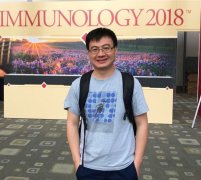邓国平
近期热点
资料介绍
个人简历
2003-2009 Ph.D. in Botany
School of Life Sciences, Peking University
1998-2002 B.S. in Biochemistry
School of Life Sciences, Lanzhou University
研究领域
Dr. Deng received his Ph.D. degree from Peking University in 2009 (mentor: Dr. Jindong Zhao). He finished his postdoctoral trainings in the labs of Dr. Mark Greene, Constantinos Koumenis and Paula Oliver in Perelman School of Medicine, University of Pennsylvania and Children’s Hospital of Philadelphia from 2011 to 2017. After this, he worked as Research Associate in the lab of Dr. James Riley in Perelman School of Medicine, University of Pennsylvania in 2018. He is currently a tenure-track assistant professor at the Department of Immunology, School of Basic Medical Sciences, Peking University.
T cells play critical roles in the adaptive immune system. The overall research interest of Deng lab is to investigate the mechanism of T cell activation, tolerance and engineering for effective immunotherapy. We use genetic and immunological approaches to determine the signaling pathways regulating T cell function in models of autoimmunity and tumor immunity. In addition, we collaborate extensively with clinics in analyzing the T cell function of patients. We are interested in studies aimed at translating fundamental understanding of T cell function into new therapies for autoimmune diseases and cancer.
近期论文
Deng G#, Song X, Fujimoto S, Piccirillo CA, Nagai Y and Greene MI#. Foxp3 Post-translational Modifications and Treg Suppressive Activity. Front. Immunol. 2019; https://doi.org/10.3389/fimmu.2019.02486.
Deng G#, Song X and Greene MI#. FoxP3 in Treg cell biology: a molecular and structural perspective. Clin Exp Immunol. 2019; https://doi.org/10.1111/cei.13357.
Deng G. Tumor-infiltrating regulatory T cells: origins and features. Am J Clin Exp Immunol. 2018; 7: 81-87.
Layman AAK*, Deng G*, O'Leary CE*, Tadros S, Thomas RM, Dybas JM, Moser EK, Wells AD, Doliba NM and Oliver PM. Ndfip1 restricts mTORC1 signaling and glycolysis in regulatory T cells to prevent autoinflammatory disease. Nat Commun. 2017; 8: 15677.
O'Leary CE, Riling CR, Spruce LA, Ding H, Kumar S, Deng G, Liu Y, Seeholzer SH and Oliver PM. Ndfip-mediated degradation of Jak1 tunes cytokine signaling to limit expansion of CD4+ effector T cells. Nat Commun. 2016; 7: 11226.
Deng G, Nagai Y, Xiao Y, Li Z, Dai S, Ohtani T, Banham A, Li B, Wu SL, Hancock W, Samanta A, Zhang H and Greene MI. Pim-2 Kinase Influences Regulatory T Cell Function and Stability by Mediating Foxp3 Protein N-terminal Phosphorylation. J Biol Chem. 2015; 290: 20211-20220.
Li Z, Lin F, Zhuo C, Deng G, Chen Z, Yin S, Gao Z, Piccioni M, Tsun A, Cai S, Zheng SG, Zhang Y and Li B. PIM1 kinase phosphorylates the human transcription factor FOXP3 at serine 422 to negatively regulate its activity under inflammation. J Biol Chem. 2014; 289: 26872-26881.
Xiao Y, Nagai Y, Deng G, Ohtani T, Zhu Z, Zhou Z, Zhang H, Ji MQ, Lough JW, Samanta A, Hancock WW and Greene MI. Dynamic interactions between TIP60 and p300 regulate FOXP3 function through a structural switch defined by a single lysine on TIP60. Cell Rep. 2014; 7: 1471-1480.
Deng G, Xiao Y, Zhou Z, Nagai Y, Zhang H, Li B and Greene MI. Molecular and biological role of the FOXP3 N-terminal domain in immune regulation by T regulatory/suppressor cells. Exp Mol Pathol. 2012; 93: 334-338.
相关热点

